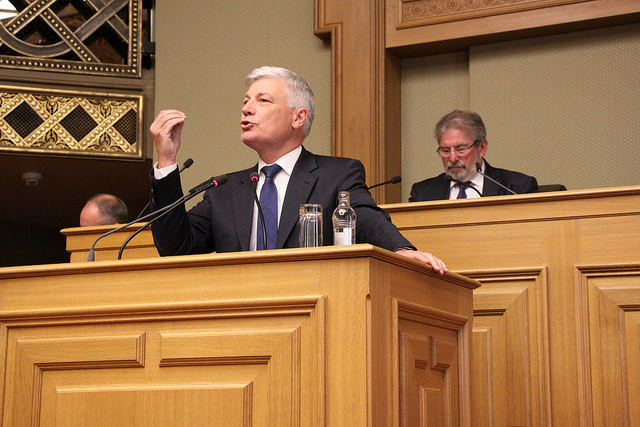CSV opposition candidate Claude Wiseler took the lead and spoke of the “naïve optimisim” and “blue sky thinking” of the coalition government. His speech was, contrary to the three previous ones (by Bettel, Gramegna and Schneider), interrupted numerous times by the government benches and made for a lively exchange.
He said that not all was well in Luxembourg: if politicians do not tackle the concerns and real problems of people, they leave the field open to populists.
Gramegna’s numbers
Wiseler attacked finance minister Pierre Gramegna’s assertion that the country’s budget numbers are good, saying they don’t reflect the whole reality--which drew boos and protests from the government benches.
The president of the CSV parliamentary group said that it necessary to think about long term problems in good times. The government’s “Zukunftspak” (a packet of comprehensive reforms announced in 2014) had been a failure and replaced by a policy of expenses and redistribution.
Wiseler sneered that with 4% growth, it should be possible to reduce the deficit, which led to the first of many interruptions by the deputy prime minister and minister for the economy Etienne Schneider (“where would you cut €1 million?”).
Wiseler accused the finance and economy ministers of spreading “alternative facts”: the deficit was in fact higher than in 2013, and that the numbers submitted to the European commission were different to the ones presented to parliament. Expenses were rising faster than income.
Triple A to be expected with 4% growth
He continued his attack by saying that the government’s pride in its triple A credit scores was completely overblown: with 4% growth it was normal to get the approval of the rating agencies. International institutions were not all glowing with praise: within the European semester, there is concern about the long term sustainability of the pension system due to the ageing population. Furthermore, the European Commission is worried that the government has already used up all its buffers. There were more heckles from the government benches.
Head in the sand
The CSV “Spitzenkandidat” (candidate for prime minister) naturally brought up the old spectre of 1.1 million inhabitants, an old debate on the number of inhabitants the country and its institutions can handle. With an increase of 74,000 people between 2010 and 2016 (for a population of 600 000 now), the issue cannot be ignored, he said.
The IGSS reported that the statistics on the viability of the pension system were all based on a population of 1.1. or 1.2 million inhabitants. Parliament had to be called to order as many MPs shouted their remonstrance, respectively their support.
The coalition government was just ignoring the issue of pension viability and leaving the mess to future governments. Parliament was in uproar about this.
Rifkin study: risky
The CSV MP criticised the lack of a road map in the Rifkin study and by the government; while some of the goals were worth taking risks for, most of them were unrealistic (especially in transport). Furthermore, the government seemed to be quietly abandoning key elements and recommendations, such as those on the sharing economy: whenever Uber or Airbnb were brought up, the relevant ministers showed reluctance, and did actually the opposite of what the Rifkin study recommended.
Wiseler argued that the study totally ignored the social and economic problems and the problems that digitalisation brings.
Land use planning
The coalition is not coherent in tackling the housing problems and land development--it had almost completed the road and public transport plan, but not the land development plan. Wiseler wondered as well how the new “co-working structures” would fit into this land development plan. Finally, he argued that all these plans were based on the 750,000 inhabitants premise--not on the 1.2 million that other plans are based on--which would then still be insufficient to sort out traffic problems and housing.
Advice to Schneider on space mining
The CSV candidate demanded a cost and benefit analysis of Schneider’s space mining projects, and wanted to know when the economy minister’s promotion activities would start to become profitable. He also gave some advice to him: instead of making this project his own, he should start binding the other parties in.
Social cohesion
Wiseler warned that that what was happening abroad should be avoided in Luxembourg. “Without immigration, nothing works in Luxembourg--but we want to keep our identity, which is open and tolerant.” He deplored that the government had cut subsidies by 50% to companies which offer language courses, and that families’ choices had been taken away on how to organise child care (whether one wants to stay at home).
Coalition works on lowest common denominator
As the main opposition party (and the largest party in parliament), a few stabs against the portrayed coalition unity could not be avoided.
The CSV MP argued that the government was too slow in coming to an agreement on the law on terrorist threats; while it was true that a balance had to be struck between efficiency and protection, Wiseler stressed that this text was needed sooner rather than later, but the coalition was unable to get to it.
He mentioned other policies which were put forward by one member of the government or MP, but then quickly denied or thrown away by others: the reduction of working time (Schneider), a burqa ban, the so-called “Platzverweis” (“removal order”--police being allowed to tell beggars or homeless people to leave a public space), Asselborn’s jabs against Hungary, which Bettel had to publicly deny afterwards, and Ceta (a red herring for the Greens).
